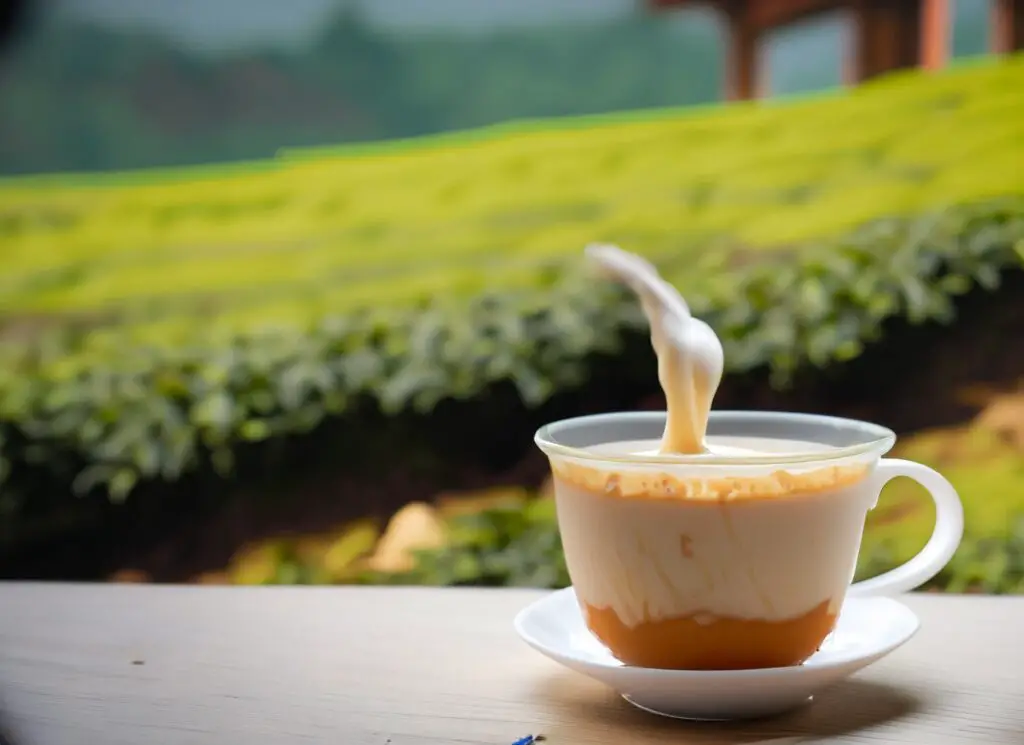As an Amazon Associate CoffeeXplore.com earns from qualifying purchases.
Does Milk Tea Have Caffeine? – Health Effects
As a tea enthusiast, I know that there’s nothing quite like the comfort of a warm cup of tea. And when it comes to milk tea, that comforting feeling is only magnified. However, if you’re someone who’s concerned about your caffeine intake, or you’re simply curious about the nutritional content of milk tea, you might be wondering: does milk tea have caffeine?
Well, the answer is yes, milk tea does contain caffeine. But don’t worry, the amount of caffeine in milk tea is generally lower than that in a cup of coffee. In this article, we’ll dive deeper into the different types of tea and their caffeine content, the effect of milk on caffeine absorption, and the positive and negative health effects of caffeine.
What is Milk Tea?
Milk tea, also known as bubble tea, is a popular tea-based drink that originated in Taiwan in the 1980s. It’s made by combining black tea, milk, and sugar. The drink is usually served cold and can be flavored with a variety of syrups and toppings, such as tapioca pearls or fruit jelly.
Does Milk Tea Have Caffeine?

Yes, milk tea does contain caffeine. The amount of caffeine in milk tea varies depending on the type of tea used and the amount of tea leaves used to make the drink. Typically, black tea is used to make milk tea, and black tea contains caffeine. However, the amount of caffeine in milk tea is generally lower than that in a cup of coffee.
How Much Caffeine is in Milk Tea?
The amount of caffeine in milk tea depends on several factors, such as the type of tea used, the amount of tea leaves used, and the brewing time. Generally, a cup of milk tea contains around 20-60 milligrams of caffeine, depending on the factors mentioned above. To put this into perspective, a cup of coffee contains around 95 milligrams of caffeine.
Factors that Affect the Caffeine Content of Milk Tea
Several factors can affect the caffeine content of milk tea, including:
- Type of tea used
- Amount of tea leaves used
- Brewing time
- Type of milk used
- Addition of other ingredients, such as syrups and powders
It’s important to note that not all milk teas are created equal when it comes to caffeine content. For example, Hong Kong milk tea is known for its high caffeine content due to the use of evaporated milk and condensed milk. On the other hand, Thai iced tea is typically made with a spiced tea blend and often contains less caffeine than traditional milk tea.
Types of Milk Tea
There are various types of milk tea, each with its own distinct flavor and nutritional profile. Let’s take a closer look at some of the most popular types of milk tea:
1. Black Milk Tea
Black milk tea is made by mixing black tea with milk and sugar. It has a bold flavor and is often served hot. Black tea is known for its high caffeine content, which means that black milk tea will also contain more caffeine than other types of milk tea.
2. Green Milk Tea
Green milk tea is made by mixing green tea with milk and sugar. It has a milder flavor than black milk tea and is often served cold. Green tea is known for its health benefits, including its high concentration of antioxidants and polyphenols.
3. Bubble Milk Tea
Bubble milk tea, also known as boba milk tea, is a Taiwanese beverage that contains small, chewy tapioca balls. It is often made with black tea, but can also be made with green tea or other types of tea. Bubble milk tea is a fun and unique twist on traditional milk tea, and its caffeine content will vary depending on the type of tea used.
Health Effects of Caffeine
Caffeine has both positive and negative health effects. On the positive side, caffeine can help boost your immune system, aid in digestion, and provide a temporary increase in energy. Additionally, black tea contains beneficial compounds such as antioxidants that can help protect against chronic disease.
However, consuming too much caffeine can also have negative health effects, such as insomnia, jitteriness, and anxiety. If you’re someone who is sensitive to caffeine, it’s important to monitor your caffeine intake and choose milk teas that are lower in caffeine, such as those made with green tea or decaffeinated tea.
Milk Tea Recipe: How to Make Milk Tea
If you’re looking to make your own milk tea at home, here’s a simple recipe to get you started:
Ingredients:
- 1 cup water
- 1 tea bag (black, green, or any flavor you prefer)
- ½ cup milk (evaporated milk, condensed milk, or regular milk)
- Sweetener (sugar, honey, or syrup)
Directions:
- Boil the water in a small pot.
- Add the tea bag and let steep for 3-5 minutes.
- Remove the tea bag and add the milk and sweetener to the pot.
- Stir well and let simmer for 1-2 minutes.
- Pour the milk tea into a cup and enjoy!
Note: If you prefer your milk tea cold, simply let it cool down after step 4 and serve over ice.
Conclusion
In summary, milk tea does contain caffeine, but the amount of caffeine varies depending on the type of tea used and other factors. Black tea contains the most caffeine, while green tea and decaffeinated tea are lower in caffeine. It’s important to monitor your caffeine intake and choose milk teas that are suitable for your caffeine sensitivity. Overall, milk tea can be a delicious and comforting beverage to enjoy, whether hot or cold.
FAQs
Does milk tea keep you awake?
Milk tea contains caffeine, which can keep you awake and cause insomnia if consumed excessively, especially in the second half of the day. However, milk tea also contains the amino acid tryptophan, which can make you sleepy after consuming it. Therefore, the effect of milk tea on sleep may vary depending on the individual and the timing of consumption. If you are sensitive to caffeine, it is recommended to avoid drinking milk tea too close to bedtime to prevent sleep difficulties.
Which has more caffeine coffee or milk tea?
Tea leaves contain more caffeine than coffee beans before they are brewed, but the average cup of tea contains about half as much caffeine as the average cup of instant coffee, and the average cup of instant coffee contains about half as much caffeine as a cup of proper espresso coffee. A study conducted in Hong Kong found that coffee and milk tea drinks contained rather high caffeine content. While bubble tea contains caffeine, the amount of caffeine in tea is still considerably less than in coffee. Therefore, coffee has more caffeine than milk tea.
Can milk tea be caffeine-free?
Yes, milk tea can be caffeine-free. Rooibos tea is a popular substitute for making milk tea without caffeine. Some bubble tea shops also offer non-caffeinated options, such as fruit teas. However, it’s important to note that some types of tea used in milk tea may contain caffeine, so it’s best to check with the shop or read the label to confirm the caffeine content. Some milk tea varieties that are typically caffeine-free include taro milk, black sugar milk, milo, and chrysanthemum tea. You can also find milk tea kits that are specifically labeled as caffeine-free.




